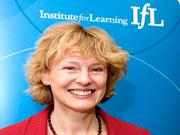Collaboration in action

On Tuesday 11 May 2010, the very day that leaders of our three main political parties were deep in deliberations about the formation of a new government, members of the Institute for Learning’s Advisory Council gathered in the basement of our building to deliberate over key policy for frontline teachers and trainers and their learners, including a national strategy for teachers’ continuing professional development (CPD).
To remind readers, IfL’s Advisory Council comprises nearly 60 members, drawn from all parts of the further education and skills sector. Three-quarters are elected member representatives, all of whom are or have been involved in frontline teaching and training. The other quarter of the Advisory Council comprises representatives from partner agencies, including trade unions and several employer associations, such as Association of Learning Providers (ALP), the Association of Colleges (AoC) and the National Institute of Adult Continuing Education (NIACE).
As you can imagine, with such a diverse group of people, who are all naturally passionate about teaching, training and successful learning, the debates get lively.
IfL recently sought the views of more than 5,000 members and over 20 key agencies on CPD. Dr Jean Kelly, who is the director of professional development at IfL, started the session by presenting an overview of a draft national CPD strategy for teachers and trainers, based on members’ views of CPD that works. Referring to the Skills Commission report, Teacher Training in Vocational Education (2010), she said that CPD had been described as “a key driver in maintaining and raising the quality of CPD in our schools, colleges and universities” and that the Skills Commission had praised the IfL model of CPD.
IfL describes our members as ‘dual professionals’. Teachers and trainers across further education and skills are experts in their vocational or subject area; and in methods in teaching and training, including using new technologies to aid learning; and they take the wider policy and their work context into account in their practice.
Dr Kelly confirmed that CPD is key to brilliant teaching, training and learning, and therefore we need a strategy and pedagogy for CPD that builds on the IfL model of dual professionalism, and takes teachers and trainers away from a tick-box approach to development opportunities. Individual teachers and trainers drive their own CPD and they seek an informed, evidence-based engagement to help them develop their practice and CPD that works and does make a real difference for their learners.
With support from the Learning and Skills Improvement Service (LSIS) Flexibility and Innovation Fund, IfL has been undertaking some research of teaching and learning, listening to the views of teachers, trainers and learners throughout the sector. To complement this and stimulate discussion as a basis for IfL’s strategy, Dr Kelly asked the Advisory Council to consider four questions:
- What is ‘brilliant teaching, training and learning?
- What principles should a CPD strategy contain?
- What should the key elements of the strategy be?
- What recommendations about approaches to CPD should be made?
Working in separate focus groups, the Advisory Council members thrashed out their ideas, before presenting their thoughts and conclusions in a plenary session. Key themes and thoughts included:
- Overwhelming agreement that the strategy should recognise and support the aspiration of individual teachers to make a difference to their learners. It might not be named ‘brilliant’ teaching and training, but everyone was sure that they knew what it was: teaching and training that works fantastically well.
- Wholehearted approval of the principle of individual ownership of CPD, but also recognition of the need for an entitlement to high-quality development from an employing organisation.
- Endorsement that the strategy should continue to make CPD relevant to the individual and keep bureaucracy to a minimum.
- Strong steers that CPD for excellent teaching should be championed and supported by IfL and institutions, including many suggestions about IfL offering a kite mark for colleges or providers giving active organisational support to teachers’ and trainers’ CPD.
This brief summary gives a glimpse of the lively discussions that took place and the wealth of ideas generated. As I listened to the groups’ debates and the findings presented in the plenary session, I could not help but feel elated about (and humbled by) how much our member representatives and partner agencies care about teaching and learning, and about IfL as their professional body.
The new coalition government was formed just a few hours after our Advisory Council meeting finished. No doubt the debates and discussions taking place behind closed doors between senior politicians in the coalition are just as robust as those of our focus groups. I truly hope that they are as constructive, purposeful and productive.
IfL will publish its CDP strategy by the autumn to support members in planning and reviewing their own CPD, and so colleges and providers can use it to inform their own strategies for CPD.
Toni Fazaeli is the chief executive of the IfL, the professional body for more than 200,000 teachers, trainers, tutors and student teachers across the Further Education and Skills sector
Read other FE News articles by Toni Fazaeli:
The curious world of politics, further education and skills











Responses